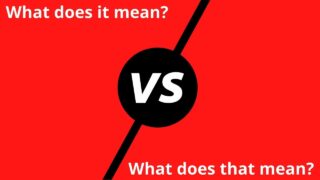Have you been wondering when to place a comma before a verb? Tricky question, isn’t it? Well, don’t get worked up because a lot of people out there also ask the same thing. In our post today, we’ll discuss when exactly you would need a comma before a verb as well as when you must …
English
When was the last time you intensely thought about whether a comma should come before the word “without”? If you are reading this post, it probably means that punctuation rules have gotten on your nerves, and you just badly want to tick this mystery off of your list. So, without further ado, let us explore …
Some of the most commonly used pronouns are “it” and “that,” and both can be grammatically used in the question “what does x mean?” However, people seem to get bothered as to when we should say “what does it mean?” instead of “what does that mean?” and vice versa. So today, we’ll look into the …
What do we say to appreciate a person who has worked with us for some time? In other words, how do we say we have enjoyed working with someone? Well, at least in English, the basic formula is to use the expression “it has been a pleasure working with you.” At the surface, this business …
It’s been a hot minute since memorizing phone numbers we dialed often was the convention. Today, not much consideration is paid to the phone number when calling someone. There are also some cases where overlaying area codes are in place– double areas code for one location. In this article, we will talk about one such …
You might assume that phone numbers follow a specific pattern throughout the world or at least within countries, as they all work to the same effect. Well, you are wrong. Differences in pattern and hence non-standardization is what enable the call system to work smoothly. The telecommunications industry is in flux, completely transforming our methods …
In olden times, people used to memorize oft-contacted numbers or noted them down in a phonebook to save time. Conversely, today, we have them saved in the contact list on our phones and can just click on them to call whoever we want to. However, we shouldn’t let the ease of the system make us …
Filling out a job application can be stressful for many different reasons. First, you might be worried about making a mistake on it or whether or not you will get the job. Then there are the questions on it that aren’t clear or the use of words or phrases that you don’t recognize. This might …
A truckload of business expressions is present in the English language. Some are fairly easy to make use of and understand, while others – not so. Sometimes, this painful fact may put us at the end of our wits because we are likely to get confused about which one is the best for a particular …









